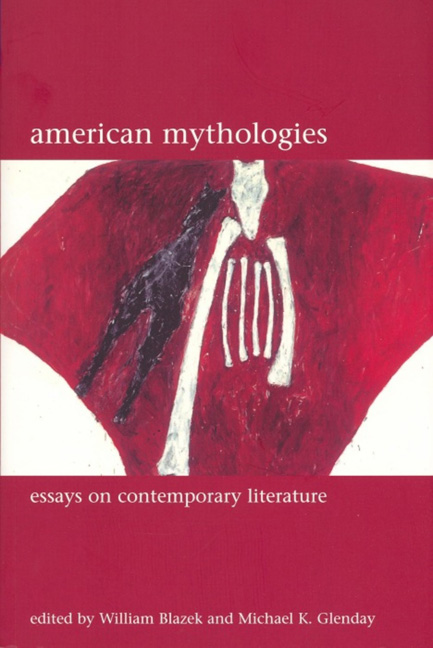Book contents
- Frontmatter
- Dedication
- Contents
- Acknowledgements
- Introduction
- 1 Indians with Voices: Revisiting Savagism and Civilization
- 2 Wild Hope: Love, Money and Mythic Identity in the Novels of Louise Erdrich
- 3 Float Like a Butterfly, Sting Like a Bee: Mythologies of Representation in Selected Writings on Boxing by Norman Mailer
- 4 The Secret Sharing: Myth and Memory in the Writing of Jayne Anne Phillips
- 5 The Individual's Ghost: Towards a New Mythology of the Postmodern
- 6 ‘Cheap, On Sale, American Dream': Contemporary Asian American Women Writers’ Responses to American Success Mythologies
- 7 ‘No Way Back Forever’: American Western Myth in Cormac McCarthy's Border Trilogy
- 8 Native American Visions of Apocalypse: Prophecy and Protest in the Fiction of Leslie Marmon Silko and Gerald Vizenor
- 9 The Brave New World of Computing in Post-war American Science Fiction
- 10 Mythologies of ‘Ecstatic immersion’: America, The Poem and the Ethics of Lyric in Jorie Graham and Lisa Jarnot
- 11 Whose Myth is it Anyway? Coyote in the Poetry of Gary Snyder and Simon J. Ortiz
- 12 Aging, Anxious and Apocalyptic: Baseball's Myths for the Millennium
- 13 Finding a Voice, Telling a Story: Constructing Communal Identity in Contemporary American Women's Writing
- Notes on Contributors
- Index
10 - Mythologies of ‘Ecstatic immersion’: America, The Poem and the Ethics of Lyric in Jorie Graham and Lisa Jarnot
- Frontmatter
- Dedication
- Contents
- Acknowledgements
- Introduction
- 1 Indians with Voices: Revisiting Savagism and Civilization
- 2 Wild Hope: Love, Money and Mythic Identity in the Novels of Louise Erdrich
- 3 Float Like a Butterfly, Sting Like a Bee: Mythologies of Representation in Selected Writings on Boxing by Norman Mailer
- 4 The Secret Sharing: Myth and Memory in the Writing of Jayne Anne Phillips
- 5 The Individual's Ghost: Towards a New Mythology of the Postmodern
- 6 ‘Cheap, On Sale, American Dream': Contemporary Asian American Women Writers’ Responses to American Success Mythologies
- 7 ‘No Way Back Forever’: American Western Myth in Cormac McCarthy's Border Trilogy
- 8 Native American Visions of Apocalypse: Prophecy and Protest in the Fiction of Leslie Marmon Silko and Gerald Vizenor
- 9 The Brave New World of Computing in Post-war American Science Fiction
- 10 Mythologies of ‘Ecstatic immersion’: America, The Poem and the Ethics of Lyric in Jorie Graham and Lisa Jarnot
- 11 Whose Myth is it Anyway? Coyote in the Poetry of Gary Snyder and Simon J. Ortiz
- 12 Aging, Anxious and Apocalyptic: Baseball's Myths for the Millennium
- 13 Finding a Voice, Telling a Story: Constructing Communal Identity in Contemporary American Women's Writing
- Notes on Contributors
- Index
Summary
Writing in his 1844 essay ‘The Poet’, Emerson famously declared that ‘America is a poem in our eyes … its ample geography dazzles the imagination’ (224). This essay examines the most recent collections of two contemporary American poets – Jorie Graham's Swarm (2000) and Never (2002), and Lisa Jarnot's Ring of Fire (2003) – in order to investigate the implications on twenty-first century poetics of America's mythologization of itself, and the ground it occupies, as a poem. Its reading of these collections will show how American (poetic) mythologies are bound together with ideas of the geographic, and with the ground (both real and metaphoric) that America occupies. Furthermore, it will argue that the poetry of Jarnot and Graham continually reminds us that the mythological frames through which we read America are ones about the conquest of space, about taking on the land, about inhabiting the ground. If, that is, the idea of America as a poem is made manifest in myths of the frontier, of exceptionalism and manifest destiny, and of romantic individualism, then it is precisely such myths that are unpicked by Jarnot's and Graham's attention to their own status as American lyric poets.
Both Lisa Jarnot and Jorie Graham are poets whose writing exposes the cultural mechanics upon which Emerson's equation between the poetic and the national is sustained. As we shall see, their poetry attempts to get beneath what could be regarded as the surface dazzle proposed by Emerson's image of America's essentially poetic nature. Indeed, in their most recent work Jarnot and Graham expressly uncover the mythologizing power of America's ideology by calling for a renewed attention to the space – cultural, ideological, poetic – that America occupies. Both of these poets, then (though with quite different inflections), concertedly explore the idea of the American Poem itself as a peculiar icon of American power. As women poets, especially, they feel a particular pressure to expose what lies underneath such structures of power.
- Type
- Chapter
- Information
- American MythologiesNew Essays on Contemporary Literature, pp. 202 - 225Publisher: Liverpool University PressPrint publication year: 2005

